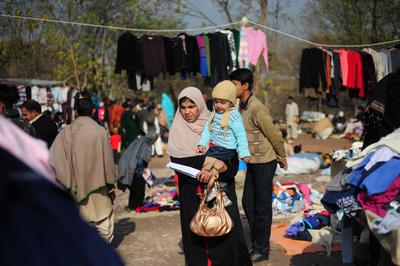Developmentally, Pakistan went backward. The UN, in its 2011 Human Development Index, reported that Pakistan slipped 20 rungs on the development ladder, moving it from a ‘medium-developed country’ to a ‘low-developed country’. Floods once again wreaked havoc, displacing nine million people and damaging 73 per cent of crops across Sindh province. These floods, combined with a slow economy in desperate need of structural reform, made it difficult for millions of Pakistanis to get back on their feet after the devastating floods of 2010, which affected more than 20 million people.
Pakistan first made international headlines in January, when the Governor of Pakistan’s largest province, Punjab, was assassinated outside a café in Islamabad. Salman Taseer was shot 26 times in the back by his personal bodyguard. Prior to his death, he had called for reforms to the country’s archaic blasphemy laws (a capital crime), which are often used to settle personal scores within villages and tribal areas, rather than to actually defend the sanctity of Islam. Thousands of Pakistanis turned out in defence of the killer, arguing it was justifiable to kill anyone who spoke negatively against the Prophet and Islam. Two months later, the only Christian minister in the Cabinet, Shahbaz Bhatti, was also assassinated following his own calls for reforms to the same law.
Cracks in the US–Pakistan relationship first appeared following the ‘Raymond Davis incident’, when Davis, a US CIA contractor, shot and killed two Pakistanis in Lahore on 27 January. Davis subsequently claimed that he was acting in self-defence. The diplomatic circus that followed the deaths of three Pakistanis (a third was killed by a US consulate vehicle dispatched to collect Davis) was immense. Davis was released in March, following the payment of ‘blood money’ to the victims’ family, and after a diplomatic tussle over immunity played out in the media.
Pakistanis continue to be obsessed with Davis, with the report of his October arrest in Colorado — for an assault charge in a supermarket car park — obtaining major media play. Pakistanis were flummoxed that Davis could get away with double homicide in Lahore, but not able to beat a minor assault charge in the US. For many on the ‘Pakistani street’, the incident highlighted how poor the rule of law is in their country.
Pakistan provided the world’s blockbuster moment on 2 May, when a covert raid conducted by the US Navy SEALs killed Osama bin Laden. The raid in Abbottabad, just north of Islamabad, created an enormous chasm in Pakistan–US relations, and for the first time had the Pakistani public doubting the competence of their highly revered military.
Just when the relationship was starting to get back on track, NATO forces killed 24 Pakistani soldiers on 26 November on Pakistani territory bordering Afghanistan. Pakistan erupted with anger at the attack and suspended all counter-terrorism cooperation pending a review of its entire relationship with the US, while also cutting off NATO supply routes through Pakistan to Afghanistan. It will be difficult for the US to repair relations, but they will have to because there is simply no other option. The US needs the support of Pakistan in order to transition out of Afghanistan.
Looking forward, the international community needs to focus more on Pakistan in 2012. Policy makers need to realise that their main challenge is Pakistan (and has been for several years), not Afghanistan. Insecurity, economic chaos, social turmoil and a political house of cards mean that Pakistan is in deep trouble and must focus on solving its domestic woes. Most importantly it needs to put in place policies to drag the economy out of its current downward spiral.
Acute energy shortages, double-digit inflation, high unemployment and a large budget deficit all need to be addressed. Tax reform continues to be placed in the ‘too-hard basket’, although only 1 per cent of the population pays tax. The government ended its three-year program with the IMF in 2011 after failing to make good on several promised reforms in this area. Pakistanis are fed up with a lack of economic opportunity and basic services, which will likely fuel instability in 2012.
The Pakistani government must stop over-committing on foreign policy at the expense of its domestic priorities. The prevention of the impending social and economic disaster facing Pakistan needs to be Islamabad’s (and Washington’s) top priority in 2012. Stability in Afghanistan and the region is unlikely without economic stability and better economic opportunity for Pakistan’s 180 million people.
Alicia Mollaun is a PhD candidate at the Crawford School of Economics and Government, the Australian National University, and is based in Islamabad.
This is part of a special feature: 2011 in review and the year ahead.

